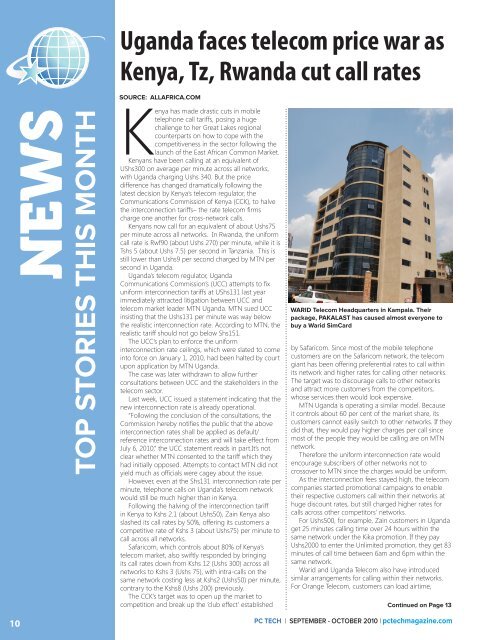Issue Seven - Conversations on Technology, Business and Society
Issue Seven - Conversations on Technology, Business and Society
Issue Seven - Conversations on Technology, Business and Society
Create successful ePaper yourself
Turn your PDF publications into a flip-book with our unique Google optimized e-Paper software.
NEWS<br />
10<br />
TOP STORIES THIS MONTH<br />
Ug<strong>and</strong>a faces telecom price war as<br />
Kenya, Tz, Rw<strong>and</strong>a cut call rates<br />
SOURCE: ALLAFRICA.COM<br />
Kenya has made drastic cuts in mobile<br />
teleph<strong>on</strong>e call tariffs, posing a huge<br />
challenge to her Great Lakes regi<strong>on</strong>al<br />
counterparts <strong>on</strong> how to cope with the<br />
competitiveness in the sector following the<br />
launch of the East African Comm<strong>on</strong> Market.<br />
Kenyans have been calling at an equivalent of<br />
UShs300 <strong>on</strong> average per minute across all networks,<br />
with Ug<strong>and</strong>a charging Ushs 340. But the price<br />
difference has changed dramatically following the<br />
latest decisi<strong>on</strong> by Kenya’s telecom regulator, the<br />
Communicati<strong>on</strong>s Commissi<strong>on</strong> of Kenya (CCK), to halve<br />
the interc<strong>on</strong>necti<strong>on</strong> tariffs– the rate telecom firms<br />
charge <strong>on</strong>e another for cross-network calls.<br />
Kenyans now call for an equivalent of about Ushs75<br />
per minute across all networks. In Rw<strong>and</strong>a, the uniform<br />
call rate is Rwf90 (about Ushs 270) per minute, while it is<br />
Tshs 5 (about Ushs 7.5) per sec<strong>on</strong>d in Tanzania. This is<br />
still lower than Ushs9 per sec<strong>on</strong>d charged by MTN per<br />
sec<strong>on</strong>d in Ug<strong>and</strong>a.<br />
Ug<strong>and</strong>a’s telecom regulator, Ug<strong>and</strong>a<br />
Communicati<strong>on</strong>s Commissi<strong>on</strong>’s (UCC) attempts to fix<br />
uniform interc<strong>on</strong>necti<strong>on</strong> tariffs at UShs131 last year<br />
immediately attracted litigati<strong>on</strong> between UCC <strong>and</strong><br />
telecom market leader MTN Ug<strong>and</strong>a. MTN sued UCC<br />
insisting that the Ushs131 per minute was way below<br />
the realistic interc<strong>on</strong>necti<strong>on</strong> rate. According to MTN, the<br />
realistic tariff should not go below Shs151.<br />
The UCC’s plan to enforce the uniform<br />
interc<strong>on</strong>necti<strong>on</strong> rate ceilings, which were slated to come<br />
into force <strong>on</strong> January 1, 2010, had been halted by court<br />
up<strong>on</strong> applicati<strong>on</strong> by MTN Ug<strong>and</strong>a.<br />
The case was later withdrawn to allow further<br />
c<strong>on</strong>sultati<strong>on</strong>s between UCC <strong>and</strong> the stakeholders in the<br />
telecom sector.<br />
Last week, UCC issued a statement indicating that the<br />
new interc<strong>on</strong>necti<strong>on</strong> rate is already operati<strong>on</strong>al.<br />
“Following the c<strong>on</strong>clusi<strong>on</strong> of the c<strong>on</strong>sultati<strong>on</strong>s, the<br />
Commissi<strong>on</strong> hereby notifies the public that the above<br />
interc<strong>on</strong>necti<strong>on</strong> rates shall be applied as default/<br />
reference interc<strong>on</strong>necti<strong>on</strong> rates <strong>and</strong> will take effect from<br />
July 6, 2010,” the UCC statement reads in part.It’s not<br />
clear whether MTN c<strong>on</strong>sented to the tariff which they<br />
had initially opposed. Attempts to c<strong>on</strong>tact MTN did not<br />
yield much as officials were cagey about the issue.<br />
However, even at the Shs131 interc<strong>on</strong>necti<strong>on</strong> rate per<br />
minute, teleph<strong>on</strong>e calls <strong>on</strong> Ug<strong>and</strong>a’s telecom network<br />
would still be much higher than in Kenya.<br />
Following the halving of the interc<strong>on</strong>necti<strong>on</strong> tariff<br />
in Kenya to Kshs 2.1 (about Ushs50), Zain Kenya also<br />
slashed its call rates by 50%, offering its customers a<br />
competitive rate of Kshs 3 (about Ushs75) per minute to<br />
call across all networks.<br />
Safaricom, which c<strong>on</strong>trols about 80% of Kenya’s<br />
telecom market, also swiftly resp<strong>on</strong>ded by bringing<br />
its call rates down from Kshs 12 (Ushs 300) across all<br />
networks to Kshs 3 (Ushs 75), with intra-calls <strong>on</strong> the<br />
same network costing less at Kshs2 (Ushs50) per minute,<br />
c<strong>on</strong>trary to the Kshs8 (Ushs 200) previously.<br />
The CCK’s target was to open up the market to<br />
competiti<strong>on</strong> <strong>and</strong> break up the ‘club effect’ established<br />
WARID Telecom Headquarters in Kampala. Their<br />
package, PAKALAST has caused almost every<strong>on</strong>e to<br />
buy a Warid SimCard<br />
by Safaricom. Since most of the mobile teleph<strong>on</strong>e<br />
customers are <strong>on</strong> the Safaricom network, the telecom<br />
giant has been offering preferential rates to call within<br />
its network <strong>and</strong> higher rates for calling other networks.<br />
The target was to discourage calls to other networks<br />
<strong>and</strong> attract more customers from the competitors,<br />
whose services then would look expensive.<br />
MTN Ug<strong>and</strong>a is operating a similar model. Because<br />
it c<strong>on</strong>trols about 60 per cent of the market share, its<br />
customers cannot easily switch to other networks. If they<br />
did that, they would pay higher charges per call since<br />
most of the people they would be calling are <strong>on</strong> MTN<br />
network.<br />
Therefore the uniform interc<strong>on</strong>necti<strong>on</strong> rate would<br />
encourage subscribers of other networks not to<br />
crossover to MTN since the charges would be uniform.<br />
As the interc<strong>on</strong>necti<strong>on</strong> fees stayed high, the telecom<br />
companies started promoti<strong>on</strong>al campaigns to enable<br />
their respective customers call within their networks at<br />
huge discount rates, but still charged higher rates for<br />
calls across other competitors’ networks.<br />
For Ushs500, for example, Zain customers in Ug<strong>and</strong>a<br />
get 25 minutes calling time over 24 hours within the<br />
same network under the Kika promoti<strong>on</strong>. If they pay<br />
Ushs2000 to enter the Unlimited promoti<strong>on</strong>, they get 83<br />
minutes of call time between 6am <strong>and</strong> 6pm within the<br />
same network.<br />
Warid <strong>and</strong> Ug<strong>and</strong>a Telecom also have introduced<br />
similar arrangements for calling within their networks.<br />
For Orange Telecom, customers can load airtime,<br />
C<strong>on</strong>tinued <strong>on</strong> Page 13<br />
PC TECH | SEPTEMBER - OCTOBER 2010 | pctechmagazine.com


